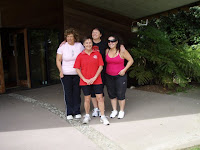
I was wondering if to include this posting, but after thinking hard I realised that in fact it had been a fantastic experience and one that I wanted to share.
In November 200

8, a group of 5 friends (colleagues at Unitec NZ) got together to spend some time together while also getting fit and healthy. A plan was made to begin training during the lunch hour, and to spur us on a goal was set to compete in the
More FM Women's series - to be exact on Sunday February 22, 2009 in the Pt Chevalier duathlon (Auckland) . This was quite a big ask, as several people had never competed in a duathlon before.
We managed to meet on several occasions, and all did a wee bit more training outside of lunchtimes too. There was a great sense of working together to achieve something - a connection beyond that normally experienced in the general run of work projects. As the day loomed near, a couple of people suffered injury, and others had family commitments, but myself and Kelly were determined to still compete. This was Kelly's first duathlon, and she shared tales of cycle training with the whole family that had me in stitches! Before the day we swapped notes on what so

rt of breakfast was advisable (full, cooked breakfast not such a good idea :-) and met at some unearthly hour on the Sunday morning of the competition.
The air was buzzing - people everywhere setting up bikes etc. To settle my nerves (Kelly wasn't nervous!) I went for a warm up trot around the block, and then we were underway. It was a tough race (a short distance which required a fair bit of anaerobic effort), but there were women of all ages, and fitnesses giving it their all - with families there to support them. Kelly did a fantastic job, and we shared a heart-felt (if rather soggy) victory hug at the end.
There was a sense of mutual achievement (emphasised by the results that we got the next day - Kelly had finished in the top half of the field in her first competition, and I'd won by a couple of minutes). I guess it's a long-winded way of saying that when there is a real goal...a real purpose for doing something collaboratively, it's much more likely to succeed. Even though some of our friends didn't make it to the competition, it took someone to come up with the idea, the group to form, the purpose to be set, and then for the support to continue. It could be a model for almost any project...it was as much about the process of training and working together, learning about each other and ourselves, as it was about the achievement of the end goal - but one, I feel, would not have happened without the other.
 Ever had that meeting where you have been working on innovative approaches to something, and then you hit the brick wall? The person or group who really do not want anything to do with what you are suggesting and are not open to seeing the potential benefits, but rather focus on issues.
Ever had that meeting where you have been working on innovative approaches to something, and then you hit the brick wall? The person or group who really do not want anything to do with what you are suggesting and are not open to seeing the potential benefits, but rather focus on issues.












